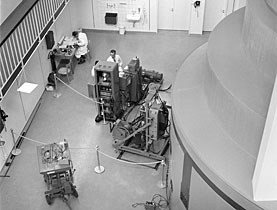Switzerland pushes its scientific prowess

Switzerland has taken a new step in promoting itself as a centre of advanced science and technology.
The so-called swissnex house in Boston, Massachusetts, opened an extension to its premises on Monday, in the presence of some 300 guests, drawn from the areas of science, politics and industry.
swissnex Boston originally opened in 2000, the first in an expanding network of similar institutions attached to Swiss consulates in key research centres throughout the world.
The speakers at Monday’s ceremony included former United States Vice President and Nobel peace-prize winner Al Gore, who praised Switzerland’s role in the scientific and technical revolution.
Gore described the swissnex science consulate in Boston as an interesting way to create a network between scientists, government and the private sector that could help find lasting solutions to such urgent issues as climate change and energy problems.
He expressed hope that under President Barack Obama the US would become a leading force in the fight against climate change.
Innovative Switzerland
The Swiss ambassador in the US, Urs Ziswiler, told assembled guests that Switzerland is an innovative country with a modern economy.
The ceremony was also attended by Mauro Dell’Ambrogio, head of the Swiss state secretariat for education and research, on his first visit to the US since taking up his job in January 2008.
Before coming to Boston, Dell’Ambrogio visited the other swissnex house in the country, in San Francisco.
He told swissinfo that he had the impression that both had become well established, with strong local and regional contacts.
The people who initially pushed through the swissnex concept “had vision, and today their ideas are a success,” he said. Swissnex is promoting exchange and cooperation between countries that stand at the cutting edge of science and technology.
Other countries in Europe are now showing interest in the philosophy of the swissnex houses, he added.
Science and diplomacy
The director of swissnex in Boston, Pascal Marmier, said that the promotion of Switzerland as a leading science centre was part of Swiss diplomacy.
He told French-language Swiss radio that swissnex presented an idea of the country far removed from the clichés. He said it demonstrated Switzerland’s readiness to collaborate and to network – something very important in the area of scientific research.
Charles Kleiber, Dell’Ambrogio’s predecessor, told the radio that swissnex was a “new form of diplomacy”. Science is an important factor in production and a source of prosperity, so it is something whose value needs to be exploited.
Swissnex Boston describes itself as a “physical and virtual environment fostering closer ties between Switzerland, New England and eastern Canada in academia, industry and society”.
It is particularly interested in fostering the next generation of “creative thinkers and leaders”, by exchanging knowledge and generating cooperation.
Broader public
But swissnex does not confine itself to exchanges with researchers. It also reaches out to the broader public.
A travelling exhibition called SCIENCEsuisse opened on Monday evening at the international terminal of Logan airport in Boston, arranged by swissnex. It features posters and interactive pieces describing the work of 25 world-class researchers from Switzerland, active in all branches of science.
Dell’Ambrogio is using his visit to further contacts and cooperation with a number of US partners. In Massachusetts he also visited the Harvard Law School and the Massachusetts Institute of Technology (MIT), where he discussed the Swiss higher-education system with its president, Susan Hockfield.
On Wednesday he is due to sign an agreement with Arden Bement, Director of the US National Science Foundation (NSF), on cooperation in science and technology between Switzerland and the US.
swissinfo, based on article in German by Rita Emch in Boston
The aim of the swissnex houses is to promote cooperation between Switzerland and other leading research countries in science, education, art and innovation.
They are designed to promote the image of Switzerland as a centre for research and innovation.
The first house was opened in 2000 under the name “Swiss House for Advanced Research and Education” (SHARE) in Cambridge near Boston.
Since then houses have been opened in San Francisco (2003), Singapore (2004) and Shanghai (2008).
A house is due to open in Bangalore, India in 2009.
Swissnex is a project of the Swiss State Secretariat for Education and Research of the interior ministry and the Swiss foreign ministry.
Two thirds of the funding comes from state sources, while the rest is private.
SCIENCEsuisse has been assembled by a number of Swiss organisations, including swissinfo’s parent company, the Swiss Broadcasting Corporation.
Also involved were the Swiss foreign ministry, the State Secretariat for Education and Research and the Swiss National Science Foundation.
It includes 25 short films, each one profiling an outstanding Swiss researcher.
A book under the same name has been published by the Lars Müller publishing house.
The films can be seen on the swissinfo site (see links).

In compliance with the JTI standards
More: SWI swissinfo.ch certified by the Journalism Trust Initiative












You can find an overview of ongoing debates with our journalists here . Please join us!
If you want to start a conversation about a topic raised in this article or want to report factual errors, email us at english@swissinfo.ch.